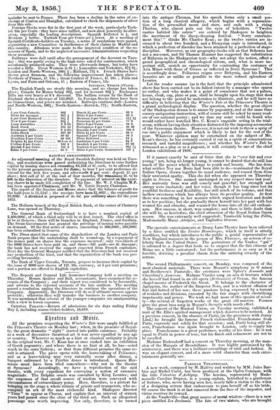The second Philharmonic concert, on Monday, was composed of the
most classical materials. There were Mozart's symphony in G minor and Beethoven's Pastorale the overtures were Sphor's Jessonda and Cherubini's Anacreon. Madame Viardot sang an aria di bravura which she herself had found in an old opera (Britannico) of Graun, the famous chapel-master of Frederick the Great. It belongs to the character of Agrippina, the mother of the Emperor Nero, and is a violent effusion of fear and hatred of her son; these passions being expressed by a torrent of roulades and divisions, executed by the fair singer with e ' • g impetuosity and power. We wish we had more of this species of novel- ty—the revival of forgotten works of the great old masters. Formes gave the great bass song in Mozart's Seraglio with much effect. The concert of the Musical Union, on Tuesday morning, exhibited a trait of Mr. Ella's spirited management which deserves to be noticed. At a previous concert, in the absence of Piatti, (in the provinces with Jenny Lind,) he brought the famous French violoncellist Franchomme from Paris expressly and solely for that occasion and, Piatti being still ab- sent, 'Franchomme was again brought to London, only to supply his place. Franchomme is a great performer, worthy of his lame: he is not equal to Piatti in power of tone, but his finish and refinement are not to be excelled.
Madame Rudersdorff had a concert on Thursday morning, at the man- sion of the Marquis of Breadalbane. It was highly patronized by the aristocracy, and there was a brilliant assemblage of rank and fashion. It was an elegant concert, and of a more solid character than such enter- tainments generally are.






































 Previous page
Previous page